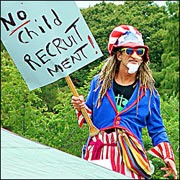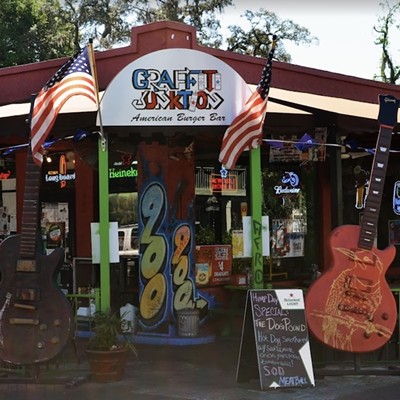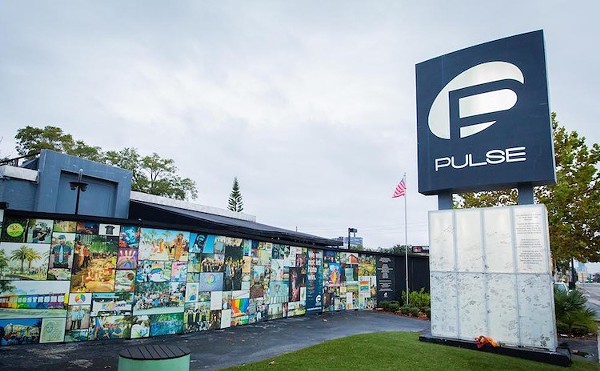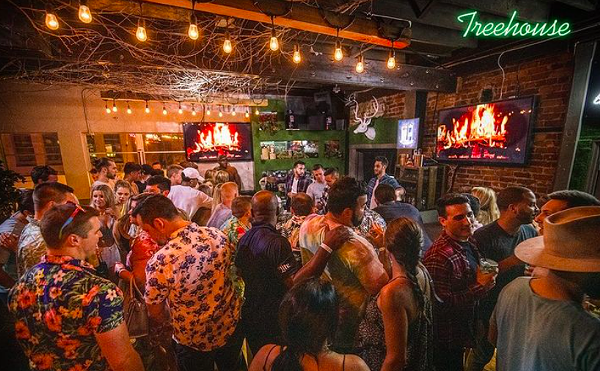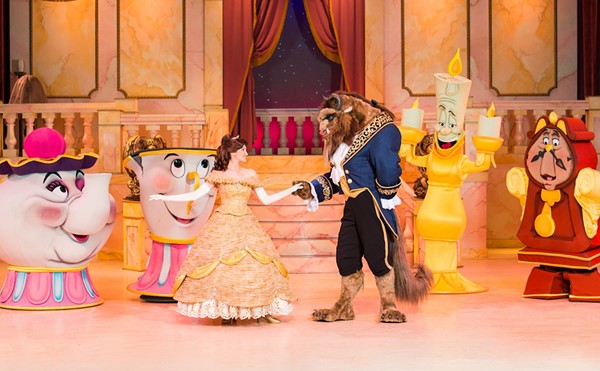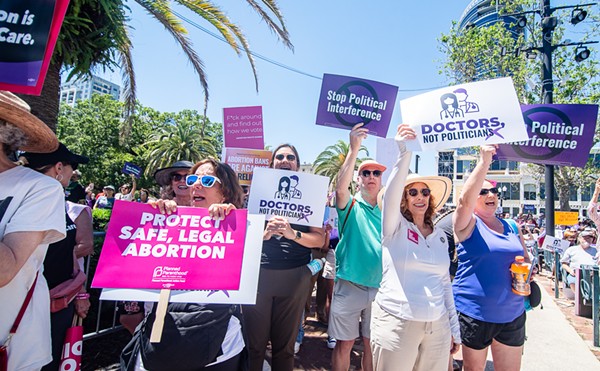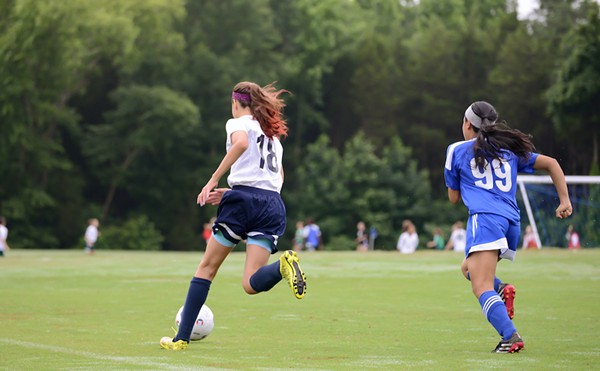I woke up to a throbbing in my lower jaw, my road trip to the anti-war protest in Washington, D.C., jeopardized by an abscessing tooth. Time to call the dentist for the right stuff. I finally pulled out around midnight, blasting up I-95 with a head full of Absolut, cold medicine and Vicodin, a white-knuckle grip on the steering wheel.
Driving through Georgia was tedious. The Georgia State Police have fleeced me more than once in the past, so I kept a low profile. Stopping off at my old duty station in Savannah, Ga., Hunter Army Airfield, I found civilians instead of the military police running the front gate. The short drive to the flagpole revealed that the post was a ghost town; there were only eight cars in the barracks parking lot where hundreds used to fight for a spot. The emptiness was eerie and frightening. Savannah is a port city. What would happen if a hurricane hit?
I looked forward to the cannon blast – 0630 hours sharp – marking the beginning of the day, when the soldiers sing the "Dog-Faced Soldier Song," the trademark tune of the Third Infantry Division. The song blared over the post loudspeakers, but there was no cannon blast, no roaring cadence, no soldiers; the base seemed to be in mourning.
After my communion with Old Glory, I reported for "sick call" at the post's dentist. While waiting for the office to open, I sat reading through the "About Us" printouts of the two main organizers of the D.C. march and protest: United for Peace & Justice, an umbrella organization encompassing 1,300 different activist groups; and the ANSWER Coalition (Act Now to Stop War and End Racism). An Airborne soldier sat down in front of me after a programmed "Good morning, sir." I extended my hand, reading the name tag on his uniform.
"Good morning, Spc. Martinez. Forget about that 'sir' stuff. I used to be Sgt. Stolzenbach; please call me Issac." I scratched at my unshaven cheek, unable to stop an enormous smile from erupting on my face at the acknowledgment of my civilian status. "So how's life in the Third Infantry Division these days?"
"Well, it's good to be home on leave, I can tell ya that." By his face I could see that he was barely old enough to drink, but his black eyes held a dark knowledge of death, affirmed by the combat patch on his right sleeve.
We engaged in small talk for a bit and then I gently asked, "Did you hear about the anti-war demonstration in D.C. this weekend? Washington's preparing for 100,000 people."
He shifted in his seat and re-examined me in earnest before replying, "Naw, I didn't hear nothin' about that." Trying to put him at ease, I informed him that Hunter was my old duty station, then said:
"Yeah, I guess Cindy Sheehan is ending her bus tour there on Saturday."
He paused before admitting he knew nothing about it. "I just got back last week, so this is all news to me. Who is she?"
"She's a grieving mother who lost her son, Spc. Casey Sheehan, in Iraq. She protested in front of President Bush's house in Crawford, Texas, while he was on vacation."
"What was she protesting about?"
"She just wanted to talk to him about the war, and he refused to speak with her."
"No way, I don't see it." He seemed distraught. "I thought he'd be there for the people; this is a democracy, right?" He let a faint laugh escape his sun-cracked lips.
"I know, right? So what do you think of this whole war biz?"
His body went stiff. "Look, I don't have any regrets, a'ight? I did my duty. I followed my orders, no regrets." He stood up and I could tell that he was agitated. "As a soldier I really can't comment on that. But I do question our motives sometimes." He gathered up his paperwork and politely excused himself.
When the dentist's office finally opened, I exhaled a sigh of relief. Finally, I'd get my tooth looked at. I offered up my Veterans Affairs identification card to the man at the counter. He blinked several times, looking between the card and his list of patients.
"I'm sorry, sir, but we only serve active duty, their dependents and retired soldiers here." The man's jowls jiggled as he spoke and scribbled away on his folders. I stood there, dumbfounded.
The pain forced me to plead, rather than come across the counter. "Sir, I'm a disabled vet eligible for health care. Are there any options? Can I pay to just have it pulled out or something?"
He waved my ID card for me to take it back, actively avoiding eye contact. "Are you 100 percent disabled?"
I shook my head no.
"Then there's nothing we can do for you. Sorry about your luck. Next."
Snatching my card back, I said, "So you mean to tell me that unless I'm active duty, a dependent, retired or doing a Stephen Hawking impression, I can't get any dental care?"
"Next!"
I walked out of the clinic in a daze and headed for the PX to grab a cup of coffee and a newspaper, but was denied even those. It was then that I came to a realization: The Army has no love for you unless you are able to pull a trigger or you're rolling around in a wheelchair. What about the nearly 15,000 military personnel injured during this war, many of whom won't be 100 percent disabled? It felt like Uncle Sam had turned his back on me. I returned to I-95 a bit deflated but doubled in determination.
After getting pulled over in South Carolina for the third time, I realized that it was a grave mistake to tell a cop in a red state that I was on my way to "cover" an anti-war protest. When I asked the second officer what he thought of the war in Iraq (while his buddy went through the car with his dog) he proudly displayed all five of his teeth in a wide smile and replied wholeheartedly, "I love Mr. Bush and I stand by everything he's done." Apparently, police in the Carolinas profile rental cars with Florida plates for drug trafficking, a law enforcement fad since the implementation of the USA PATRIOT Act.
The cop thought I needed to go to jail for storing my vitamins and prescriptions in an Altoids tin. He compared each pill to pictures of various Ecstasy and narcotic tablets, then he used his fat, sausage-like fingers to flick them off the hood of his cruiser when they didn't match up. "I don't care if you throw the vitamins out, but please don't throw out the little white ones," I said. "I might end up on the news without those."
He picked up the tin from his car, looked me in the eye and tossed the contents to the ground. "That's not my problem. You should have thought of that before traveling with unmarked medications." A jolt of pain shot from my jaw to my groin.
THE REVEREND AND I
Entering the thrust of D.C. traffic is a head-swimming experience, doubly so when you have been on the road for 24 hours. The splendor of the capital proper steals your breath. Time stops just for an instant on I-395 when you curve around to face the 555-foot-tall Washington Monument against the moonlit sky. Plenty of time to admire it up close tomorrow at the rally; after three pull-overs, two flats and a full day of driving, I planted my head in a fire-retardant pillow.
The next morning I awoke with yuck-mouth and a thumping at the hinge of my jaw; it hurt to complain. After munching some Vicodin and downing a shot of espresso, I hopped on the subway and headed for Federal Triangle, a manifest point where protesters converged for three different events: the anti-war march, the anti-war rally and a protest of the World Bank and International Monetary Fund's annual meetings.
Unsure of where I was, or was supposed to be, I hobbled off in the direction of the tightest cluster of picket signs. On the way I caught a faint sparkle of progressive thought, the rebirth of a counterculture. This hit me the moment I started swimming to the cadence of homemade drums through children sporting tie-dye, braided pigtails, overalls, pins, buttons and stickers. Parents who marched on the White House in their youth were educating their children about the responsibility of active citizenship. (Research in cultural anthropology reveals that Millennials, the children of Baby Boomers born after 1985, share a buddy-buddy relationship with their parents and generally follow their parents' political persuasions. Let's just hope the kids don't end up selling out like their parents did. The languid relationship between Generation X and their Boomer parents went the other way; Gen-X'ers tend to do anything as long as it is opposed to their parental units' ideologies.)
On the Washington Monument grounds, I caught a glimpse of an undulating monk wearing an ochre-colored robe, counting out prayer beads. He looked American. "Namaste!" I greeted him.
He turned with an inquisitive eye and cocked eyebrow. "Namaste. How are you doing?"
"Just another day in paradise." I motioned at the drizzle. "May I sit?"
He adjusted his legs, shifting from left-over-right to right-over-left. He seemed stiff, but courteous. "Sure, what can I do for you?"
I sat down and tucked away my notepad and recorder. "I'm just curious which Buddhist tradition you are with, if there's going to be a large group of you all, what you think of all this … just to talk." He tells me that he's a Bhikkhu monk of the Theravada Buddhist tradition, one of many gathering to participate in the march on the White House. Buddhism's most sacred hallmark is the practice of nonviolence; an anti-war protest would almost seem incomplete without them.
He exhaled deeply and thought before answering the last question. "I have just returned from Mongolia. I am part of a movement to help the Mongolian people reappropriate their Buddhist culture after 200 years of communists killing those who practiced. It's a real eye-opening experience to view the United States from the outside. And with Katrina hitting the Gulf Coast, it was like pulling the curtain back from the wizard. I think Americans are starting to realize who they have running their country. His keepers couldn't react fast enough to keep him out of trouble and the world saw him for the halfwit that he is." He took a deep breath and closed his eyes. "This is all cynical bullshit."
My jaw dropped. "Buddhists aren't supposed to curse!"
"Yes, this is true, and the richest nation in the world isn't supposed to let its people starve in the streets either." He kept breathing deeply and returned to his beads and rocking. "I think that is enough. I'm going to find my group." I thanked him for his time and headed toward the stage.
Picking up my press credentials, I found that the event was controlled with typical Republican discipline. They had all the press corralled behind a green plastic fence; it was like a pack of rabid dogs, chewing on the fence to get the attention of the program leaders on the other side of the barrier. There were three runners, who picked out dignitaries for the rabid reporters and brought the interviewees to the fence. There were press members from all over the world: Japan, Mexico, England, Haiti and the Middle East. They were all jumping at the fence like Jack Russell terriers on meth.
I caught sight of the Rev. Jesse Jackson coming out of the dignitary pit into the rabid reporter pit – thus making himself fair game – to meet with a colleague. Sneaking over, I checked over both shoulders to make sure none of the other reporters swooped down. I walked up right as Jackson and his friend were introducing each other, so I held back for a beat and then dove in for a handshake. "The good Rev. Jesse Jackson!" I said, shaking his hand vigorously and clasping my left hand to his elbow. "How you doin', sir?!" I secretly thought to myself, "Holy shit!" but decided it would be inappropriate to say that out loud. "Wow, you being here really brings legitimacy somehow. You've been a peacemonger for a while, haven't you?"
He was distracted, but I was getting closer; after all, I doubted he could go far without his hand going with him. "Rev. Jackson, why did you come out for this rally, speaking out against the war in Iraq?"
He answered, "The war in Iraq was based on lies and misinformation. Fighting to end slavery, to end segregation, that's a war worth fighting. World War II, fighting to end fascism, anti-Semitism and racism, that's a war worth fighting. Invading Panama and Grenada? Wars not worth fighting; wars not based on moral justification. The one in Iraq, based on pre-eminent threat, `was` based on al-Qaida-9/11 connections, `but` there were no such connections; `it was` based on weapons of mass destruction `but` we never determined that. If there are any weapons of mass destruction in Iraq, they were taken there by Rumsfeld himself. So Americans are beginning to see that we are losing lives, and money, and honor, so we must go another way. We deserve better!"
"Do you think it's ironic that the bill for the hurricane and the bill for the war are both roughly $200 billion dollars? And do you think we'll have the money?" I asked.
"Well, there's enough money to rebuild the Gulf Coast if we reduce the amount of money in Iraq and end the permanent tax cuts for the wealthy. We cannot fight against poverty, illiteracy and disease and fight a war without moral foundations and keep tax breaks for the wealthy. We are giving the top 10 percent permanent tax cuts, and a lot of them avoid paying taxes and then go out and get no-bid contracts. That's corruption! We deserve better than that!"
A runner pulled him back into the pit; I listened to my recorder and took notes while keeping an eye on the Jack Russell journalists. Standing away from the crowd, I noticed Cindy Sheehan going to the stage with Rev. Jackson. The floor to the stage was at eye level to the media huddled behind it. Sheehan's microphone came on. "I want you all to pat yourselves on the back. You are a part of history," she said. "We need a people's movement to stop this war. Our good friends in the media aren't doing their jobs. Our good friends in Congress aren't doing their jobs. George Bush certainly isn't doing his job, but you know what? We have to do our jobs as Americans! We will be the checks and balances on this out-of-control, criminal government!"
The crowd erupted in a frenzy. I peered through the stage components to notice something about Sheehan that I was sure no other reporter would scoop. She has a tattoo on her left ankle in memoriam of her son, who died in Iraq: "Casey '79-'04," resting between four red stars.
While Sheehan was speaking, I saw former United States attorney general Ramsey Clark sneaking out of the pit with his entourage. He was the first authority today to flatly say we need to begin impeachment proceedings.
Concerned that an action like that would leave the United States with Dick Cheney in charge, I accosted him on his way out. "Wouldn't impeaching Bush just leave us with Dick?"
He stopped dead in his tracks and peered at me. Coming closer, he placed his hand on my arm. "This should be self-evident. I'm proposing that we go all the way down the line. Bush, Cheney, Rumsfeld, get them all! We have to go right down the line. All of them must leave." He stared right through me. "That should be abundantly clear."
I left the pit and went swimming through the crowds.
WHAT PROTEST?
The next morning, when I woke up with a pounding in my entire head from that bastard tooth, there was no news of the rally or the march on any of the D.C. news channels. The closest they came to covering it was an interview with Diane Ibbotson, whose son, Forest Jostes, died in the same attack as Sheehan's son Casey. Ibbotson is from the opposite political affiliation as Sheehan and thinks that our troops should remain in Iraq for however long it takes.
I blasted home as fast as I could. I went straight to the wires before unpacking to see if a head count was ever released, but none was. But there were plenty of pundits who tried to say that the participants were un-American, which disgusted me on many levels.
The people who attended the rally were not the kind to shield themselves behind an American flag lapel pin; these people have no need for such trinkets because they wear Old Glory in their hearts, exercising the American right to dissent while demonstrating love and concern for their fellow human beings. The real radical groups out there lurking in the wilderness are necessary reminders that if we don't take responsibility as engaged/ informed citizens, one of our own might soon pull the trigger or push the button.
Our Constitution is functional because the people who wrote it bled for it. A document embracing the ideals and political governance of a people is not a cake to be baked and delivered. We should get our boys and girls out of Iraq before civil war breaks out, and let the people decide if a democracy is what they want.

